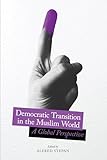Democratic transition in the Muslim world [Texte imprimé] : a global perspective / edited by Alfred Stepan
نوع المادة : نصالسلاسل:مداخل تحليلية: أظهر التحليلاتتفاصيل النشر:New York : Columbia University Press, cop. 2018وصف:1 vol. (254 p.) ; 23 cmتدمك:
نصالسلاسل:مداخل تحليلية: أظهر التحليلاتتفاصيل النشر:New York : Columbia University Press, cop. 2018وصف:1 vol. (254 p.) ; 23 cmتدمك:- 978-0-231-18431-1
- 320.961109051 23E
- 320.9M
| نوع المادة | المكتبة الحالية | رقم الطلب | رقم النسخة | حالة | تاريخ الإستحقاق | الباركود | |
|---|---|---|---|---|---|---|---|
|
|
Bibliothèque centrale En accès libre | 320.9M / 970 (إستعراض الرف(يفتح أدناه)) | 1 | المتاح | 000007069673 |
Browsing Bibliothèque centrale shelves, Shelving location: En accès libre إغلاق مستعرض الرف(يخفي مستعرض الرف)
Bibliogr. p. 227-236
Why different democratization outcomes in Tunisia and Egypt? Islamic-Secular Party accommodations, constitutions, militaries, and the content of international assistance -- "Ennadha's democratic commitments, and capabilities : major evolutionary moments and choice" / Rachid Ghannouchi -- "The challenges of democratization in the Arab world : some reflections on the Egyptian case" / Carrie Rosefsky Wickham -- "Mutual accommodation between moderate Islamic and moderate secular activists" / Alfred Stepan -- "The roots of Egypt's constitutional catastrophe : the necessity of marrying analysis of context, process and text" / Nathan J. Brown -- "Civil and political society compromises in the crafting of a progressive and consensual constitution" / Monica Marks -- "Legacies for democratization of prior patterns of civil-military relations" / Hicham bou Nassif -- "Why so much international assistance for an authoritarian military in Egypt and so little for democratic transition and consolidation in Tunisia? / Radwan Masmoudi -- Rethinking other democracies with large muslim populations: what policies helped in Indonesia and india? -- "Crafting Indonesian democracy : inclusion- moderation and the sacralizing of the postcolonial state" / Jeremy Menchik -- "Crafting of a democracy with the world's largest Muslim minority" / Sudipta Kaviraj
Contributors to this book are particularly interested in expanding our understanding of what helps, or hurts, successful democratic transition attempts in countries with large Muslim populations. Crafting pro-democratic coalitions among secularists and Islamists presents a special obstacle that must be addressed by theorists and practitioners. The argument throughout the book is that such coalitions will not happen if potentially democratic secularists are part of what Al Stepan terms the authoritarian regime's "constituency of coercion" because they (the secularists) are afraid that free elections will be won by Islamists who threaten them even more than the existing secular authoritarian regime...
لا توجد تعليقات على هذا العنوان.











